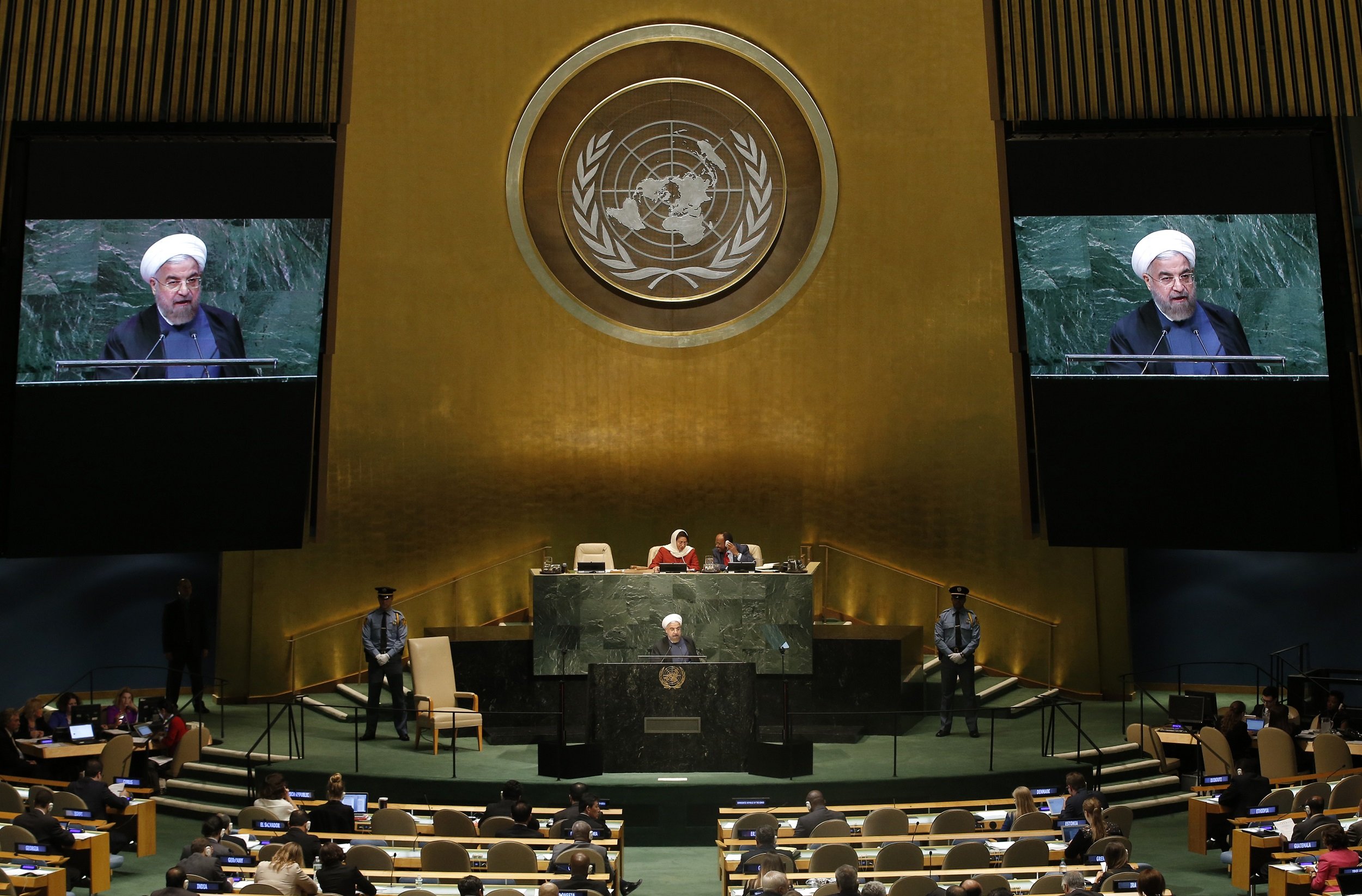
President Hassan Rouhani of Iran contended in his speech at the United Nations on Thursday that his country is among the world's moderates who fight violence and extremism. Tehran, he indicated, will join the West, despite its failings, in fighting against the extremists. But first a nuclear deal must be struck.
To advance such a deal, the State Department announced Thursday that Secretary of State John Kerry will meet Iran's foreign minister, Javad Zarif, and the European Union's foreign affairs commissioner, Catherine Ashton, this evening. Kerry's participation in the meeting at the U.S. temporary headquarters at the Waldorf Astoria Hotel has raised new hopes for a deal over Iran's nuclear file.
It is possible for such a deal to be struck before the latest deadline to achieve it, November 24, the Iranian president told the U.N. General Assembly, but warned that first the West would need to show some flexibility. Only when such flexibility becomes evident, he said, can both the West and Iran fight together against extremism (a word Rouhani used 23 times in his speech.)
"We are determined to continue our confidence-building approach and our transparency" in the nuclear negotiations, Rouhani said. "If our interlocutors are equally motivated and flexible," then "an entire different environment will emerge," and Iran and the West can cooperate on "very important regional issues, such as combating violence and extremism."
Iran's detractors, however, say that a country that executed 1,000 people last year, many of them in public hangings from construction cranes, cannot so easily claim the mantle of moderation or preach against extremism.
Rouhani's speech "ignored serious abuses perpetrated by Iran's security forces—who continue to arrest peaceful protesters and activists—and a judiciary that sentences journalists and Internet users to heavy punishments, including death, and hangs child offenders," said Faraz Sanei, an Iran watcher at Human Rights Watch.
There were other discrepancies between Rouhani's lofty words at the U.N. and the realities surrounding Iran.
Rouhani, for one, warned America and the West that if their aim in forging a coalition to fight the Islamic State, more commonly known as ISIS, is "to continue their hegemony in the region, they would make a strategic mistake."
Yet this week Iranian-backed militias of the Shiite Houthi tribes took over Sana, the capital of strategically located Yemen, overthrowing an elected prime minister. Iran's "Shiite crescent," an area of hegemony that spans Iraq, Syria and Lebanon, with great influence elsewhere, is growing longer.
And even as Rouhani blamed "strategic blunders of the West in the Middle East, central Asia and the Caucasus" for the rise of Al-Qaeda, ISIS and other Sunni terror groups, the Iranian-backed Lebanese-based militia, Hezbollah, remains high on the State Department's terrorist list. Last year Hezbollah was also added to the European Union's terrorist list.
Amateur psychologists may dismiss Rouhani's speech as Iran's "projection" of its own faults unto the West. But the real business of nuclear negotiations and of returning Iran to the fold of respectable nations is getting into a high gear as the coalition against ISIS gels.
"I met with the president of Iran [Tuesday] because Iran must be an actor" in the anti-ISIS coalition, the French president, François Hollande, told reporters on Wednesday. British Prime Minister David Cameron, who had met with Rouhani earlier, said he and the Iranian leader "noted the threat posed to the whole region by [ISIS], and agreed that all states in the region must do more to cut off support for all terrorist groups, including financial support."
In the almost nonstop negotiations that have been taking place between representatives of the world's top powers and Iran since last week, several ideas have been floated to resolve the standoff over Tehran's nuclear program. In the past, the West demanded that Iran dismantle most of the 19,000 centrifuges it uses to enrich uranium. Iran, meanwhile, insists it needs—for what Rouhani stressed was peaceful purposes—to add up to 190,000 more centrifuges.
One compromise that was floated, according to sources close to the negotiations, is to cut off the pipes that connect the centrifuges together and supplies uranium to the machines. Iran then can keep its existing centrifuges. Tehran officials have rejected the idea in public, but a Western official close to the negotiations said that it, as well as other approaches to break the deadlock, are still being discussed.
Meanwhile, just before Rouhani and his entourage arrived in New York, the International Atomic Energy Agency (IAEA), the world's nuclear watchdog, denounced Iran's lack of cooperation with the agency. The report stated that Iran has yet to dispel suspicions that its nuclear program is far from peaceful.
Israel's minister for intelligence and strategic affairs, Yuval Steinitz, also issued a statement this week, saying that his office "can confirm with confidence" that since 2000-to-2001 Iran has conducted tests whose only possible purpose is "to ignite the nuclear chain reaction in nuclear weapons."
The tests, according to Steinitz, were conducted in Parchin, a highly secretive military installation that Iran has refused to open up to visits by IAEA inspectors who have long demanded access to the site.
Follow Benny Avni on Twitter: @bennyavni
Uncommon Knowledge
Newsweek is committed to challenging conventional wisdom and finding connections in the search for common ground.
Newsweek is committed to challenging conventional wisdom and finding connections in the search for common ground.
About the writer
To read how Newsweek uses AI as a newsroom tool, Click here.






